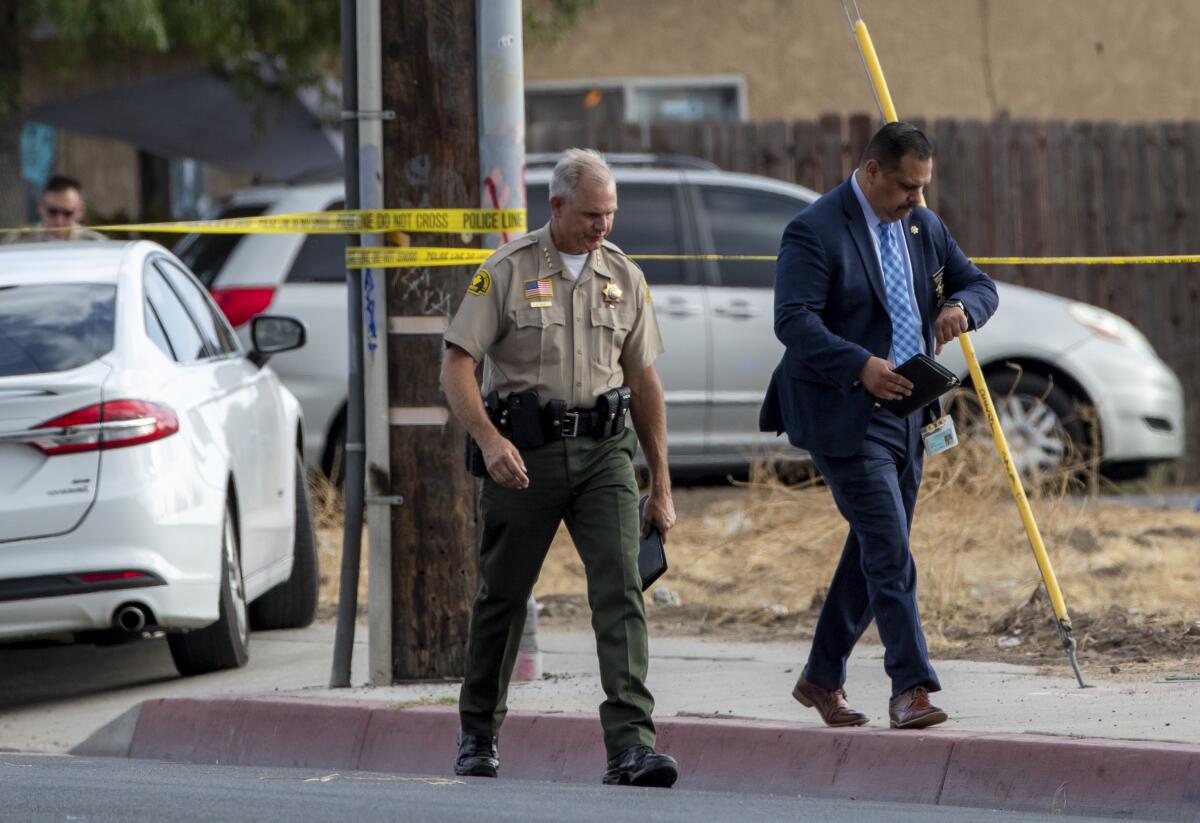FBI and San Bernardino County Sheriff’s Department accused of illegally seizing marijuana cash

- Share via
The driver of an armored car carrying $712,000 in cash from licensed marijuana dispensaries was heading into Barstow on a Mojave Desert freeway in November when San Bernardino County sheriff’s deputies pulled him over. They interrogated him, seized the money and turned it over to the FBI.
A few weeks later, deputies stopped the same driver in Rancho Cucamonga, took an additional $350,000 belonging to legal pot stores and gave that cash to the FBI too.
Now, the FBI is trying to confiscate the nearly $1.1-million bounty, which it might share with the San Bernardino County Sheriff’s Department. The FBI says the money is tied to federal drug or money-laundering crimes, but has specified no unlawful conduct and charged no one with a crime.
The cash seizures — and another from the same trucking company in Kansas — raise questions about whether the Justice Department under President Biden is moving to disrupt the operations of licensed marijuana businesses in California and other states where pot is legal.
The case has also rekindled allegations that federal law enforcement agencies in Southern California have been abusing forfeiture laws by seizing cash and valuables from people when the government has no evidence that they committed crimes.
The FBI and the U.S. attorney’s office in Los Angeles have been forced to return tens of millions of dollars in cash and valuables seized by federal agents last March from hundreds of safe deposit boxes in Beverly Hills after the government failed to produce evidence to back up its allegations that the money and goods were criminal proceeds. Some of that money belonged to owners of state-licensed marijuana businesses.
The FBI’s attempt to confiscate tens of millions of dollars from Beverly Hills safe deposit boxes draws resistance and charges of government misconduct.
Now, Judge John W. Holcomb of U.S. District Court in Riverside is weighing a request by Empyreal Logistics, the company whose armored cars were emptied in California and Kansas, for an emergency order to force the FBI and the Sheriff’s Department to stop pulling over its vehicles and seizing cash without evidence of illegal activity. The company is also trying to get back the cash.
Empyreal says it follows U.S. Treasury Department guidelines on how to handle the cash of state-licensed marijuana businesses without running afoul of federal law and verifies that the dispensaries whose money it carries are in good standing with state regulators.
“This is among the more egregious forfeiture cases that we’ve ever seen,” said Dan Alban, senior attorney at the Institute for Justice, a libertarian group that fights forfeiture excesses nationwide and represents Empyreal in its lawsuit.
Alban called the cash seizures a “very cynical attempt to exploit the differences between federal and state law” on marijuana.
Possession and sale of marijuana remains illegal under federal law, but 36 states have legalized medical cannabis, and 18, including California, allow recreational pot.
During the 2020 presidential campaign, Biden promised to let states “continue to make their own choices regarding legalization.” He also vowed to decriminalize marijuana, but he has taken no steps to keep that pledge.
A Justice Department spokesperson did not respond to repeated questions by email on whether the Biden administration’s policies on marijuana enforcement permit seizures of cash from businesses licensed to sell cannabis.
Empyreal’s lawsuit describes the traffic stops of their trucks as “highway robberies” by government agents seeking to pad their budgets with forfeiture money.
It accuses the San Bernardino County Sheriff’s Department of breaking a California law that protects financial institutions serving pot dispensaries. It also alleges that the FBI and the U.S. Drug Enforcement Administration violated a federal law that bars spending government money to interfere with medical marijuana businesses in states where they are legal. Empyreal says seven of the eight state-permitted dispensaries whose cash was taken in San Bernardino County were licensed to sell medical marijuana.
The Sheriff’s Department and federal authorities deny wrongdoing, saying Empyreal is seeking a court injunction that would improperly impede active criminal investigations of suspected money laundering and illegal drug sales.
Federal prosecutions of marijuana crimes have been rare in California since 2013, when a memo by then-Deputy Atty. Gen. James M. Cole advised U.S. attorneys in states that have legalized the drug to bypass all but the most serious cases, such as those involving violent gangs or cartels.
The Trump administration rescinded the Cole memo, but federal prosecutors in California are still reluctant to bring marijuana cases before juries accustomed to widespread pot smoking.
Black-market marijuana — untaxed, unburdened by environmental rules and cheaper than legal cannabis — has continued to thrive in the five years since California legalized recreational pot, and San Bernardino County Sheriff Shannon Dicus has been cracking down on illegal farming in the high desert.
In the five months since he launched Operation Hammer Strike, deputies say they have seized more than 400,000 cannabis plants and arrested 527 suspects.
Illegal marijuana grows have exploded across the California desert, along with forced labor, ecological destruction and fear
In response to the lawsuit over the armored cars, Dicus released a statement claiming that more than 80% of the marijuana sold in licensed dispensaries is grown illegally, but he provided no evidence that any of the eight businesses whose cash deputies seized from Empyreal’s vans were selling black-market cannabis.
“My deputies are professional, and I am confident we will prevail,” Dicus said.

The reluctance of banks to do business with marijuana dispensaries has forced many to operate entirely with cash. But since 2014, when the government’s Financial Crimes Enforcement Network released guidance on how to take deposits from state-licensed dispensaries without breaking federal law, more than 700 banks and credit unions nationwide have begun accepting their money.
Empyreal, a Pennsylvania company that transports cash for dispensaries, convenience stores and other clients in 28 states, relies on banks and credit unions to do the federally mandated due diligence on marijuana outfits whose cash it carries, said Deirdra O’Gorman, Empyreal’s chief executive. The company checks state licensing records to verify compliance, she said.
The first sign of trouble for Empyreal came on May 17, when a sheriff’s deputy in Dickinson County, Kan., pulled over one of its vans’ drivers on I-70 for an alleged traffic violation and questioned her.
She told the deputy she was on her way to pick up cash at medical pot dispensaries in Kansas City, Mo., then planned to drive the money back through Kansas the next morning to deposit it at a credit union in Colorado, according to the DEA. Medical marijuana is legal in Missouri but not in Kansas.
The next morning, the DEA put the driver under surveillance as she made her stops in Kansas City. On her way back through Kansas, the same sheriff’s deputy stopped her again on I-70. This time, the deputy seized the more than $165,000 in cash that the driver had collected at five state-licensed dispensaries in Missouri.
The DEA and the U.S. attorney’s office in Kansas are trying to confiscate the cash, claiming it is tied to unspecified federal drug and money-laundering violations by unnamed people.
An audio recording captured DEA agent Bryson Wheeler telling the Kansas sheriff’s deputy that law enforcement officers should “crush” every Empyreal vehicle they can identify, according to a court filing by the company. Wheeler also told the deputy that legal cannabis proceeds cannot be transported lawfully across state lines, which the company says is false.
The deputy responded, “We’ll start taking them all down at once,” according to the Empyreal court filing.
In the Barstow case, sheriff’s deputies say they pulled over the armored car on Nov. 16 after allegedly seeing the driver tailgating. The driver and his supervisors, who spoke to a deputy by phone during the stop, gave “inconsistent statements,” creating suspicion the van was carrying “illicit proceeds of unlawful drug sales,” Sheriff’s Sgt. Alex Naoum said in a court statement.
The deputy got a state Superior Court judge to sign a search warrant authorizing the seizure of currency, electronics and any other evidence of illegal transport of “marijuana proceeds.”
In its court papers, Empyreal says Deputy Jonathan Franco’s apparent confusion over how the company operates led him to falsely tell the judge that it converts dispensaries’ cash into cryptocurrency. Empyreal says Franco also falsely told the judge that some of the pot stores whose cash was in the van were unlicensed.
Franco’s warrant application stated that Empyreal lacked a marijuana business license. The company says no license is required to carry cash from legal dispensaries to banks.
On Dec. 9, deputies pulled over the same driver in Rancho Cucamonga, this time for allegedly changing lanes without signaling and “driving too fast for conditions.” The FBI says money-laundering suspicions were raised during the stop in part because the driver was carrying a document instructing him to never say “cannabis” or “marijuana” if stopped by law enforcement officers, and to never identify Empyreal’s clients.
A drug-detection dog named K9 Eros alerted deputies to the odor of narcotics near the open driver’s door, Naoum said.
Empyreal’s lawsuit says that video footage from the van shows that K9 Eros was “barely interested in the vehicle.” With mixed success, deputies tried to cover the van’s cameras, it says, but an audio recording captured them counting the $350,000 in cash and voicing disappointment it was less than half the haul in Barstow.
“That’s it?” one of them asked the deputy who had seized the money in Barstow. “You set the bar too high.”
One of the deputies said he’d expected to find “a million or two,” and another responded: “At least we got over a million.”
No traffic citations were issued to any of the Empyreal drivers.
More to Read
Sign up for Essential California
The most important California stories and recommendations in your inbox every morning.
You may occasionally receive promotional content from the Los Angeles Times.










